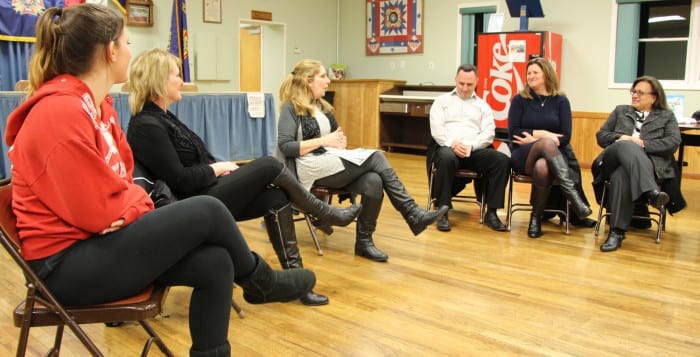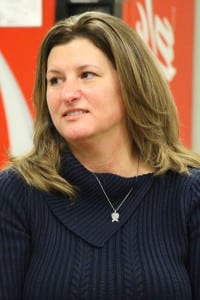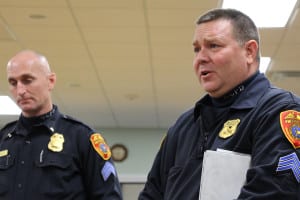Residents look at heroin use on Long Island

“Addiction is a family disease.”
That’s what Tracey Budd and social worker Mary Calamia had to say during the North Shore Drug Awareness Advocates’ community event about heroin use on Long Island.
Around 20 residents gathered at the Rocky Point Veterans of Foreign Wars headquarters on Feb. 24 to discuss drug laws, heroin use in the community and how to combat the Island’s heroin issues.

Budd, of Rocky Point, established the North Shore Drug Awareness Advocates group last fall. Her son, Kevin Norris, was one of many heroin users on Long Island before he died of an overdose in September 2012. Budd hoped to educate Long Island communities on drug awareness and establish a support system for drug users and their families who are seeking help, with the creation of this group. She tries to hold a meeting at least once a month.
“I’m hoping that as parents, neighbors, [and] friends, we learn how to advocate [about drug awareness] a little more, rather than putting it on Facebook,” said Budd about residents who have sought help, especially with acquiring Narcan, through social media outlets. She was among several residents, including Dorothy Johnson, who said people need to change how they view heroin users.
Johnson is a member of the Great Bay coalition. She lost her son four years ago to a heroin overdose and has fought to increase drug awareness ever since. For Johnson, heroin and drug users aren’t junkies, but everyday people in need of help.
“It’s not that they’re bad and sitting on a street corner,” Johnson said. “It’s somebody that’s walking around in a suit and tie that comes from a good family.”
Many of these families do not change how they view or deal with their relative once they return from a rehabilitation center. According to Calamia, treating rehabilitated individuals as though they still use heroin or other drugs will only encourage future drug use.
In light of heroin use on Long Island, the Suffolk County Police Department started using Narcan in August 2012, according to Dr. Scott Coyne, chief surgeon for the police department. The anti-overdose medication was used more than 470 times in 2013 and 2014 and 543 times last year. While Narcan allows officials and those trained to administer it to save people who overdose on heroin or opiate-based drugs, public and safety officials said some drug users abuse the system.

Capt. William Murphy said the police department has saved an unidentified Mastic Beach resident around 11 times using Narcan. Councilman Kevin LaValle (R-Selden) added that one woman who got into a car crash on Middle Country Road and Nicolls Road a few weeks ago demanded Narcan from First Responders. According to LaValle, officials can’t test a resident’s blood after receiving Narcan.
Currently, patients can go home shortly after officials administer the medication. Budd is trying to establish a 72-hour hold for these patients, which will allows hospitals to monitor patients following the procedure.
She also helped establish a 24-hour hotline for drug users and their families or friends who are looking for help, after she attended a conference at the Suffolk County Executive Steve Bellone’s (D) office last September. That hotline should be up and running, according to Budd, by April 1.
“Sometimes I feel bad for the young kids we’re locking up,” said Sgt. Keith Olsen of the SCPD. “They need help. They’re not the dealer. They’re not turning it over. They’re not the ones causing trouble.”






